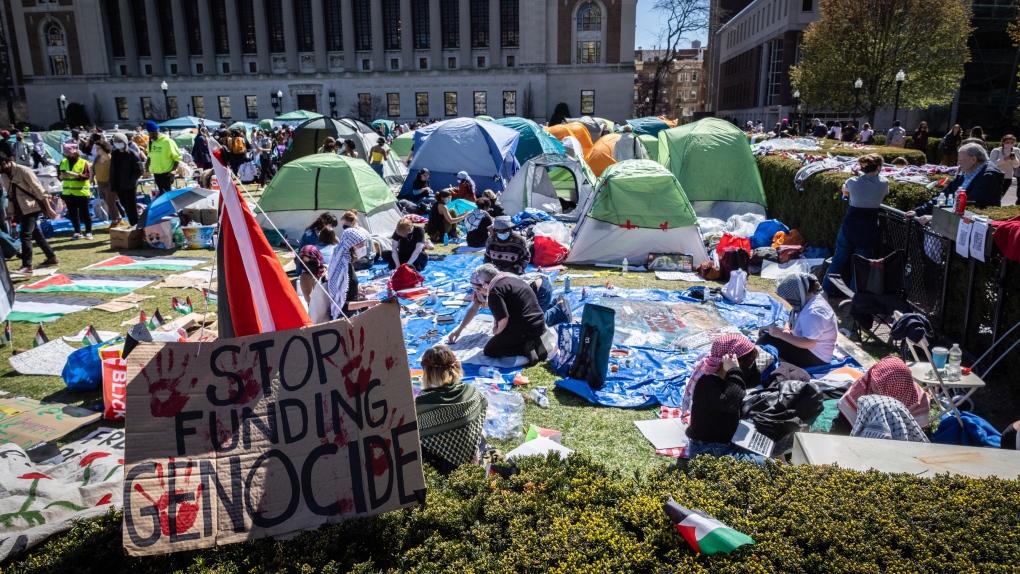NEW YORK –
Police arrested dozens of people at a pro-Palestinian demonstration at Yale University on Monday, hours after Columbia University cancelled in-person classes in response to protesters setting up tent encampments at its New York City campus last week.
Demonstrators blocked traffic around Yale’s campus in New Haven, Connecticut, demanding the school divest from military weapons manufacturers. Police arrested more than 45 protesters, according to the student-run Yale Daily News.
Protests at Yale, Columbia and other university campuses across the nation began in response to the escalation of the Israeli-Palestinian conflict, following the deadly cross-border raid by Hamas militants on Oct. 7 and Israel’s fierce response in the Gaza enclave controlled by Hamas.
In an email to Columbia staff and students on Monday, Columbia President Nemat Minouche Shafik said the university was cancelling in-person classes and moving to online teaching to “deescalate the rancor and give us all a chance to consider next steps.”
Last week, Shafik called in New York Police to clear a tent encampment protesters had set up on Columbia’s main lawn to demand the school divest from Israel-related investments, an unusual move condemned by some faculty.
The school said the encampment violated rules. Police arrested more than 100 students from Columbia on Thursday on charges of trespassing. Columbia and the affiliated Barnard College have suspended dozens of students involved in the protests.
“These tensions have been exploited and amplified by individuals who are not affiliated with Columbia who have come to campus to pursue their own agendas,” said Shafik, who last week testified before a U.S. House of Representatives committee, defending the school’s response to alleged antisemitism by protesters.
Republicans in the House and the Senate, as well as at least one Democratic senator, demanded Shafik resign in letters and statements on Monday.
The New York Police Department has had scores of officers on the busy Manhattan streets around Columbia’s campus, where angry confrontations have unfolded between pro-Palestinian and pro-Israel groups. Police have received reports of Israeli students having flags snatched from their hands, but no reports “of any physical harm against any student,” Tarik Shappard, the chief police spokesperson, said at a press conference on Monday outside the campus.
Student protesters spent several nights sleeping in the open on the lawn, and have since set up tents again. Students have organized both Muslim and Jewish prayers at the encampment, and some have given speeches condemning Israel and Zionism and praising Palestinian armed resistance.
More than 100 Columbia faculty joined students on Monday in solidarity at the encampment, where an outdoor seder was planned to mark the first day of the Jewish Passover holiday.
 A sign that reads, Gaza Solidarity Encampment, is seen during the Pro-Palestinians protest at the Columbia University campus in New York, Monday April 22, 2024. (Stefan Jeremiah / AP Photo)
A sign that reads, Gaza Solidarity Encampment, is seen during the Pro-Palestinians protest at the Columbia University campus in New York, Monday April 22, 2024. (Stefan Jeremiah / AP Photo)
‘Reprehensible and dengerous’
U.S. President Joe Biden, who has been criticized by the protesters for supplying funding and weapons to Israel, said in a statement on Sunday that his administration has put the full force of the federal government behind protecting the Jewish community.
“Even in recent days, we’ve seen harassment and calls for violence against Jews,” Biden said. “This blatant antisemitism is reprehensible and dangerous – and it has absolutely no place on college campuses, or anywhere in our country.”
New York City Mayor Eric Adams, in a statement on Sunday, said he was “horrified and disgusted with the antisemitism being spewed at and around the Columbia University campus.” He gave examples of a woman who had been “yelling, ‘We are Hamas,’ or groups of students chanting ‘We don’t want no Zionists here.'”
Student organizers from the Columbia encampment criticized the Biden and Adams statements, noting that some of the organizers are Jewish and that news outlets had focused on “inflammatory individuals who do not represent us.”
“We firmly reject any form of hate or bigotry and stand vigilant against non-students attempting to disrupt the solidarity being forged among students – Palestinian, Muslim, Arab, Jewish, Black and pro-Palestinian classmates and colleagues,” they said in a statement.
“It’s very clear to us that people on the outside do not understand what this encampment is about,” said Lea Salim, a Barnard sophomore who said she was one of 15 Jewish students arrested on the Columbia lawn last week. Salim said it was not antisemitic to criticize the state of Israel.
She added the students “fiercely and vehemently denounce these bigots” who have harassed Jewish students in the public streets around campus.
The students are demanding the school divest from corporations that profit from Israel actions in Gaza and the West Bank, transparency of the school’s financial investments and amnesty for students and faculty disciplined over their calls for Palestinian liberation.
The Columbia president wrote in her campus-wide email that the protesters must be open to compromise. “We cannot have one group dictate terms and attempt to disrupt important milestones like graduation to advance their point of view,” Shafik wrote.
Columbia’s commencement is scheduled for May 15.
(Reporting by Brendan O’Brien in Chicago and Kanishka Singh in Washington D.C.; Additional reporting by Jonathan Allen; Editing by Chizu Nomiyama and Bill Berkrot)







